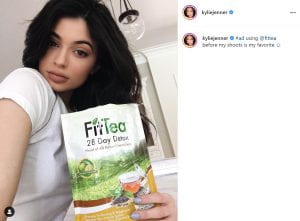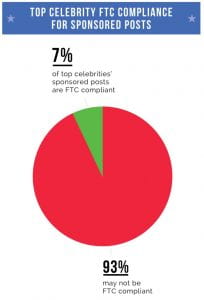
Hi, lambs. It’s me, your Gram celeb. Who wouldn’t like to start their day with a bowl of oatmeal with these freshly picked berries? Remember that I’m always with you, lambs. #yummy #healthybreakfast #mylifestyle #protein #Thanks XYZ.
Up to this point, you may think that your Instagram celebrity wants to share a healthy breakfast with you. You may even feel pleased to see that your celebrity took the time to post such a personal picture, until you read further:
Thank you, XYZ Company, for your healthy breakfast delivery. Love, XOXO.
While some people feel nonchalant about promoted products, some followers may feel betrayed to know that their celebrities are only using their accounts to earn money. You feel tired of seeing these sponsored posts. Are there any legal actions against the Instagram celebrity to melt your deceived heart?
What’s so disturbing and tricky about Instagram influencer marketing is that users cannot always detect whether they are being exposed to digital advertising.
According to an Instagram internal data research, approximately 130 million accounts tap on shopping posts every month. There are a plethora of guides on digital marketing for rising influencers, and one of the highest noted tips is to advertise a product with storytelling. The main theme is to advertise as naturally as possible to make consumers feel engaged—and subsequently, have them make a purchase.
In Jianming Jyu v. Ruhn Holdings Ltd., the court held that social media has become so influential that being a social media influencer is now recognized as a profession. The court defined social media influencers as “individuals who create content on social media platforms such as Facebook, YouTube, Tik Tok, and Instagram with the hope of garnering a large public following [and] who are paid to promote, market and advertise products and services to their fans and followers.” Id.
Take this as another example: your cherished, ever-so-harmless Instagram mega-celebrity wore a beautiful Gucci belt. The celebrity mentioned that the same belt was available on Amazon, which was on sale for less than a quarter of the actual price at Gucci. You immediately purchased the belt, thanking your celebrity and yourself for following the celebrity. Upon the belt’s arrival, you realized that the belt was conspicuously fake with the brand named Pucci. On November 12, 2020, Amazon sued 13 individuals and businesses (collectively, the “defendants”) for advertising, promoting, and facilitating the sale of counterfeit luxury goods on Amazon. The defendants used their Instagram and other social media accounts to promote their knockoff goods being sold on Amazon. Amazon stated that they are seeking damages and an injunction against the influencers to bar them from using Amazon. As of July 4, 2021, the case is still pending.
Okay, we get it. But that’s something Instagram celebrities have to resolve. What about us, the innocent lambs?
Are there any legal actions on digital marketing? Yes!
A digital advertising claim may be brought in state or federal court or action brought by a federal administrative agency, such as the Federal Trade Commission (FTC). Generally, Instagram advertising is considered online advertising, which the FTC regulates. The FTC Act prohibits deceptive advertising in any medium. That is, “advertising must tell the truth and not mislead consumers.” A claim can be misleading if relevant information is left out or if the claim implies something that is not true. So, if an influencer promotes a protein bar that says it has 20 grams of protein, but it actually had 10 grams of protein, it is misleading.
Furthermore, the FTC Act states that all advertising claims must be “substantiated,” primarily when they concern “health, safety, or performance.” If the influencer quoted the protein bar company, which stated that there was research that their protein bar lowered blood pressure, the FTC Act requires a certain level of support for that claim. Thus, online influencers are liable for the products they endorse on social media platforms.
Wait, there is one more. Due to the growing number of fraudulent activities on Instagram, the FTC released new regulations targeted at Instagram influencers. According to 16 CFR § 255.5, the FTC requires that an influencer shall “clearly and conspicuously disclose either the payment or promise of compensation prior to and in exchange for the endorsement or the fact that the endorser knew or had reason to know or to believe that if the endorsement favored the advertised product some benefit.” In sum, an influencer must disclose that the post is sponsored. The FTC noted that the hashtags like “partner,” “sp,” “thanks [Brand]” are not considered adequate disclosures. Otherwise, it is a violation subject to penalty.

Simply putting hashtag “ad” is not an option
The marketing Mediakix issued a report on top celebrity Federal Trade Commission compliance for sponsored posts and found that 93% of the top Instagram endorsements did not meet the FTC’s guidelines.

Going back to the oatmeal example, using the hashtag “#Thanks XYZ” is not sufficient to show that the post is sponsored, and the celebrity is subject to penalty.
As a rule of thumb, all Instagram sponsorships must be disclosed no matter what, and the disclosures must be clear about the sponsorship. Playing hide-and-seek with hashtags is never an option.
What is your opinion on digital marketing? If you were a legislator, what should the regulation on digital marketing be?

